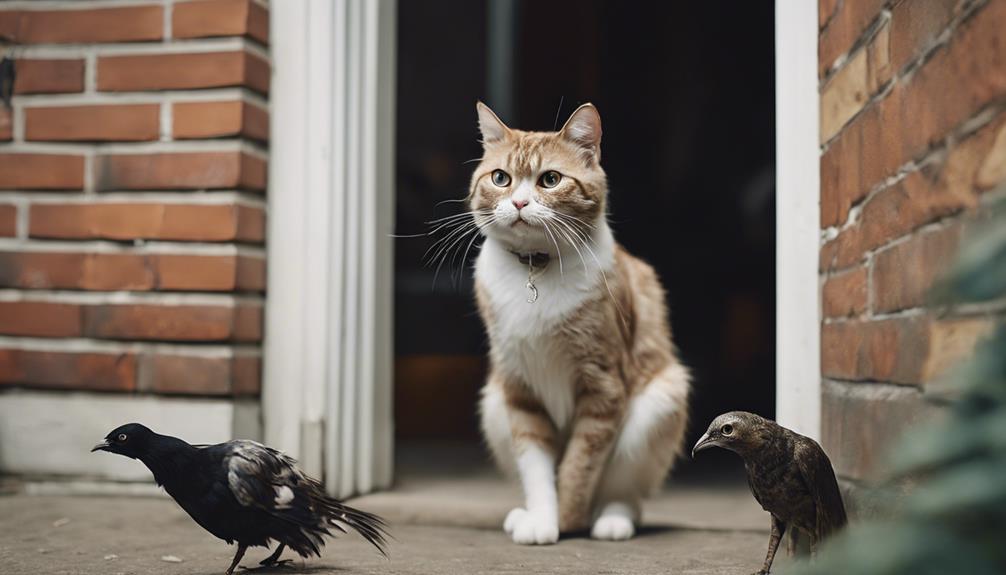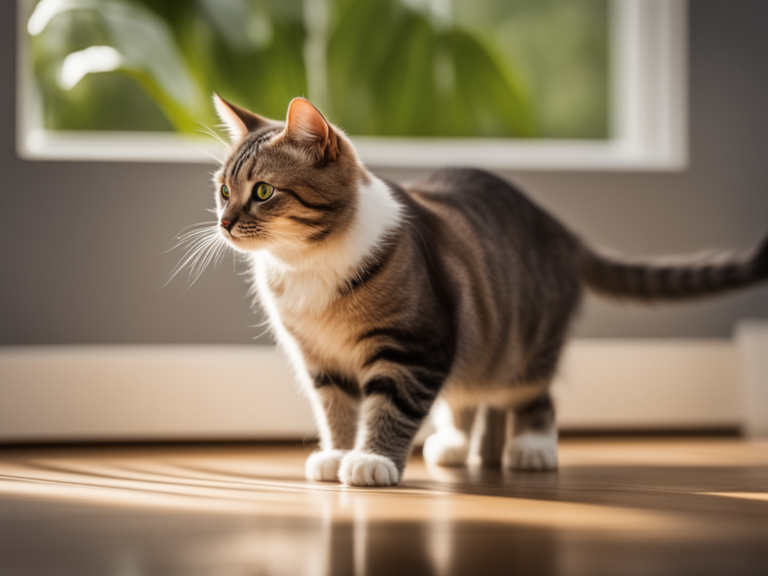How Do I Get My Cat To Stop Bringing Home Dead Animals

How Do I Get My Cat To Stop Bringing Home Dead Animals: You might feel like your cat is running a feline wildlife rescue program with the way they bring home their ‘presents.’ But fear not, there are ways to curb this behavior and keep your home free of these unwanted gifts. By understanding why your cat engages in this behavior and implementing some strategic changes, you can help minimize the hunting instinct that drives them to bring home these surprises. Stay tuned to discover some practical tips that may just save you from those unexpected encounters.
Understanding Your Cat’s Behavior
To understand why your cat brings home dead animals, observe its behavior patterns and instincts closely. Cats are natural hunters, and this behavior stems from their instinct to hunt prey. In the wild, cats bring back prey to their young or to share with the rest of the colony. When your cat brings home these gifts, it displays a natural behavior that it believes is beneficial to the group.
Understanding your cat’s behavior is crucial in addressing this issue. Behavioral modifications may be necessary to discourage this behavior. One approach is environmental enrichment. By providing your cat with engaging toys, scratching posts, climbing structures, and interactive playtime, you can redirect its hunting instincts toward more appropriate targets. Additionally, ensuring your cat is mentally and physically stimulated can help reduce the urge to hunt and bring home dead animals.
Cat psychology plays a significant role in why your cat engages in this behavior. It’s essential to remember that your cat isn’t trying to upset you but is simply following its natural instincts. By understanding these instincts and providing suitable outlets for them, you can help prevent your cat from bringing home unwanted “gifts.” With patience, consistency, and a deeper understanding of your feline friend, you can make behavioral modifications that benefit both you and your cat.
Providing Alternative Play Options
Consider introducing a variety of engaging toys and interactive activities to redirect your cat’s hunting instincts towards more suitable targets. Cats have natural hunting instincts, and providing alternative play options can help satisfy these instincts in a way that doesn’t involve bringing home unwanted presents. Here are some suggestions to keep your feline friend entertained and mentally stimulated:
- Interactive Puzzles: Interactive puzzles are a great way to challenge your cat’s mind and provide mental stimulation. These puzzles often involve hiding treats or toys inside compartments that your cat has to figure out how to access, simulating the thrill of the hunt in a safe and controlled environment.
- Climbing Structures: Cats love to climb and perch up high to survey their surroundings. Investing in climbing structures like cat trees, shelves, or window perches can give your cat an outlet for their natural climbing behavior. Climbing structures not only provide physical exercise but also serve as a safe space for your cat to observe the world around them.
- Feather Wands and Laser Pointers: Engaging your cat in interactive play with feather wands or laser pointers can help simulate hunting behavior. These toys allow your cat to chase, pounce, and stalk, providing an outlet for their predatory instincts in a way that is fun and safe for both your cat and local wildlife.
Limiting Outdoor Access
If your cat’s hunting behavior is causing concern, restricting their outdoor access can be a practical solution to prevent them from bringing home unwanted prey. Indoor enrichment and behavioral modification techniques can help keep your feline friend mentally stimulated and reduce their desire to hunt.
Creating a stimulating indoor environment is essential when limiting your cat’s outdoor access. Providing interactive toys, scratching posts, climbing structures, and puzzle feeders can help mimic the hunting experience and keep them mentally engaged. Rotating toys and introducing new ones regularly can prevent boredom and satisfy their natural instincts.
Behavioral modification plays a crucial role in deterring your cat from hunting outdoors. Using positive reinforcement techniques, such as rewarding desired behaviors like playing with toys instead of hunting, can help reshape their behavior. Redirecting their focus from outdoor hunting to indoor activities can be achieved through consistent training and patience.
Gradually reducing outdoor access by supervising their time outside and eventually transitioning to full indoor living can effectively curb their hunting behavior. It’s important to provide a safe and enriching indoor environment to ensure your cat remains happy and healthy. Remember, each cat is unique, so finding the right balance of indoor enrichment and behavioral modification is key to successfully limiting their outdoor access.
Using Deterrents in Your Yard
If you’re tired of finding unwanted gifts from your cat in your yard, consider fencing in your yard or installing motion-activated devices as deterrents. These measures can help discourage your cat from hunting and bringing home animals. Creating a cat-friendly environment while still implementing these deterrents can strike a balance between your cat’s instincts and your desire to keep your yard animal-free.
Fence in Yard
To deter your cat from bringing home dead animals, consider installing a fence around your yard as a physical barrier. Fencing can help keep your cat contained within your property and prevent them from hunting wildlife. Here are some tips to effectively use fencing as a deterrent:
- Invisible Fencing: Consider using invisible fencing systems that emit a mild static correction when your cat approaches the boundary.
- Cat Containment: Opt for fences that are specifically designed to contain cats, with no escape routes or climbing opportunities.
- Secure Gates: Ensure that your fence has secure gates that are always closed to prevent your cat from sneaking out.
Install Motion-Activated Devices
Consider enhancing your yard’s security by installing motion-activated devices as a strategic approach to deter your cat from bringing home dead animals. These devices are effective in providing nighttime surveillance, helping to discourage your cat’s hunting instincts when it’s dark outside. Motion-activated lights or alarms can startle your cat, making it think twice before attempting to hunt. Moreover, some devices offer remote monitoring capabilities, allowing you to keep an eye on your yard even when you’re not at home. This feature enables you to intervene if your cat is lurking around and attempting to catch prey. By incorporating these motion-activated devices, you can create a more controlled environment that discourages your cat from engaging in hunting behavior.
Rewarding Non-Hunting Behavior
Encouraging your cat’s positive actions through rewards can be a powerful way to shift their focus away from hunting. By using positive reinforcement techniques like treats or playtime, you can reinforce behaviors that don’t involve hunting. Redirecting your cat’s prey drive towards interactive toys or puzzles can also provide mental stimulation and fulfill their natural instincts in a non-harmful way.
Positive Reinforcement Techniques
Wondering how you can reinforce positive behaviors in your cat and deter hunting instincts? Utilizing positive reinforcement techniques can be effective in redirecting your cat’s focus. Here are some strategies to consider:
- Clicker Training: Use a clicker to mark desired behaviors, followed by treat rewards to reinforce them.
- Treat Rewards: Offer your cat special treats when they exhibit non-hunting behaviors to encourage these actions.
- Consistency in Training: Maintain a consistent approach in rewarding your cat’s positive behaviors to help them understand what is expected.
Redirecting Prey Drive
To redirect your cat’s prey drive and reward non-hunting behavior, focus on implementing positive reinforcement techniques consistently. Indoor entertainment plays a crucial role in keeping your cat engaged and mentally stimulated. Provide interactive toys, puzzle feeders, and climbing structures to satisfy their natural instincts in a non-harmful way. Behavior modification involves redirecting your cat’s attention from hunting to more appropriate activities. When your cat engages in play or displays calm behavior, offer treats, praise, or affection to reinforce these desirable actions. Consistency is key in reshaping your cat’s behavior, so ensure all family members follow the same approach. By encouraging non-hunting activities and rewarding positive behavior, you can help your cat overcome the urge to bring home dead animals.
Training With Positive Reinforcement
When training your cat to stop bringing home dead animals, utilizing positive reinforcement techniques can be highly effective in modifying their behavior. Positive reinforcement focuses on rewarding desired behaviors to encourage their repetition. Here are some tips to help you implement positive reinforcement training effectively:
- Clicker Training: Clicker training involves using a clicker to create a distinct sound that marks the moment your cat performs the desired behavior. This sound signals to your cat that a treat reward is coming, reinforcing the behavior that precedes it.
- Treat Rewards: Treat rewards are a powerful tool in positive reinforcement training. Choose high-value treats that your cat loves and only give them when your cat displays the desired behavior. This creates a strong association between the behavior and the reward.
- Consistency: Consistency is key in positive reinforcement. Make sure to reward your cat every time they exhibit the desired behavior initially, gradually transitioning to intermittent reinforcement as the behavior becomes more established.
Providing Mental Stimulation at Home
To keep your cat mentally stimulated at home, creating an enriching environment is key. Interactive toys and games can provide the mental exercise your cat needs. By incorporating these elements into your cat’s daily routine, you can help prevent boredom and decrease the likelihood of them hunting outdoors.
Enriching Environment for Cat
Engage your cat’s curious mind by creating an environment filled with interactive toys and engaging activities. To provide mental stimulation for your feline friend, consider the following:
- Indoor obstacles: Set up a small obstacle course using boxes, tunnels, or shelves to encourage your cat to explore and navigate different challenges.
- Puzzle feeders: Use puzzle feeders to make mealtime more exciting and mentally stimulating for your cat. These devices require your cat to work for their food, satisfying their hunting instincts.
- Interactive play sessions: Spend quality time playing with interactive toys like laser pointers or feather wands to keep your cat entertained and mentally engaged throughout the day.
Interactive Toys and Games
Enhance your cat’s mental stimulation at home through the use of interactive toys and games. Puzzle feeders provide both mental and physical enrichment, encouraging your cat to work for their food. Interactive play with toys like laser pointers and feather wands can mimic hunting behaviors, keeping your cat engaged and active. Rotate different toys regularly to prevent boredom and maintain their interest. Engaging your cat in play sessions not only provides mental stimulation but also strengthens your bond. Consider setting aside dedicated playtime each day to keep your cat entertained and mentally sharp. Remember, a stimulated cat is less likely to exhibit unwanted behaviors like bringing home dead animals.
Consulting With a Veterinarian
When seeking guidance on how to address your cat’s behavior of bringing home dead animals, consulting with a veterinarian is a crucial step to understanding the underlying reasons and finding effective solutions. Veterinarians have the expertise to assess your cat’s behavior and provide tailored advice to help modify this unwanted behavior. Here are some key points to consider when consulting with a veterinarian:
- Behavior Modification: A veterinarian can recommend specific behavior modification techniques tailored to your cat’s needs. These techniques may include positive reinforcement training, redirection strategies, or creating a structured routine to deter hunting behavior.
- Environmental Enrichment: Your veterinarian can provide insights into enriching your cat’s environment to reduce the likelihood of hunting and bringing home prey. This may involve adding vertical spaces, puzzle feeders, interactive toys, or creating outdoor enclosures to satisfy your cat’s natural instincts in a controlled manner.
- Health Assessment: Consulting with a veterinarian also allows for a thorough health assessment of your cat. Some medical conditions can contribute to hunting behavior. Your veterinarian can rule out any underlying health issues that may be influencing your cat’s behavior.
Using Bells on Your Cat’s Collar
If your veterinarian suggests exploring additional strategies to deter your cat from bringing home dead animals, a practical approach could involve using bells on your cat’s collar. Bells can be effective in alerting wildlife to your cat’s presence, potentially reducing their hunting success. When considering collar options, look for ones that have securely attached bells designed for pet collars to ensure they do not come off easily.
Introducing bells on your cat’s collar can serve as a behavior modification technique. As your cat moves, the bells create a sound that can warn potential prey, giving them a chance to escape. Over time, your cat may associate the ringing of the bells with unsuccessful hunting attempts, which could help in discouraging the behavior of bringing home dead animals.
When starting with bells on the collar, it’s essential to allow your cat to get used to the new accessory. Use positive reinforcement techniques such as treats and praise to help them associate the bells with positive experiences. Additionally, monitor your cat’s comfort level with the bells and ensure they do not cause any distress or discomfort.
Incorporating bells on your cat’s collar can be a simple yet effective way to modify their behavior when it comes to hunting and bringing home dead animals. Remember to be patient and consistent in implementing this strategy to see potential positive results over time.
Implementing Indoor Hunting Games
To enrich your cat’s indoor environment and satisfy their natural hunting instincts, consider incorporating engaging indoor hunting games into their daily routine. Indoor enrichment is crucial for keeping your feline friend mentally stimulated and physically active. Here are some tips to make feline playtime more exciting and rewarding:
- Interactive toys: Invest in interactive toys that mimic prey movements, such as robotic mice or feather wands. These toys can engage your cat’s hunting instincts and provide hours of entertainment.
- DIY puzzle feeders: Create DIY puzzle feeders using simple household items like cardboard boxes or empty toilet paper rolls. Hide treats or kibbles inside these feeders to encourage your cat to “hunt” for their food, keeping them mentally engaged.
- Hide and seek: Play a game of hide and seek with your cat using their favorite toys or treats. This game not only stimulates their hunting instincts but also strengthens the bond between you and your feline companion.
How Do I Get My Cat To Stop Bringing Home Dead Animals Frequently Asked Questions
Can I Punish My Cat for Bringing Home Dead Animals?
Punishing your cat for bringing home dead animals is not effective. Instead, focus on positive reinforcement to encourage alternative behaviors. Consider environmental enrichment to satisfy their natural prey drive. Redirecting their instincts in a positive way can help.
Will Getting My Cat Fixed Stop Them From Bringing Home Dead Animals?
Getting your cat fixed can help with behavioral modification by reducing their instinctual drive to roam and hunt. It’s an effective way to decrease hunting behavior. Environmental enrichment and providing alternatives like interactive toys can complement this approach.
How Do I Stop My Cat From Hunting if They Are an Outdoor Cat?
To stop your outdoor cat from hunting, focus on behavior modification and environmental enrichment. Use toys to redirect hunting instincts, provide interactive feeders, and create a stimulating environment to satisfy natural instincts. Consistency and positive reinforcement are key.
Can I Train My Cat to Only Bring Home Certain Types of Animals?
When it comes to training your cat to only bring home certain animals, selective training and species-specific training can help. Use positive reinforcement to encourage desired behavior. Behavioral modification techniques can be effective in this process.
Will Using a Shock Collar on My Cat Prevent Them From Bringing Home Dead Animals?
Using a shock collar on your cat may stop them from bringing home dead animals, but it raises ethical concerns and can harm your feline friend. Behavior modification techniques like positive reinforcement are safer and more effective.
Conclusion
In conclusion, understanding your cat’s natural hunting instincts and providing alternative play options, limiting outdoor access, using deterrents, rewarding non-hunting behavior, providing mental stimulation, consulting with a veterinarian, using bells on your cat’s collar, and implementing indoor hunting games can help stop your cat from bringing home dead animals. By taking these steps, you can help redirect your cat’s behavior and create a more harmonious environment for both your pet and the local wildlife.








